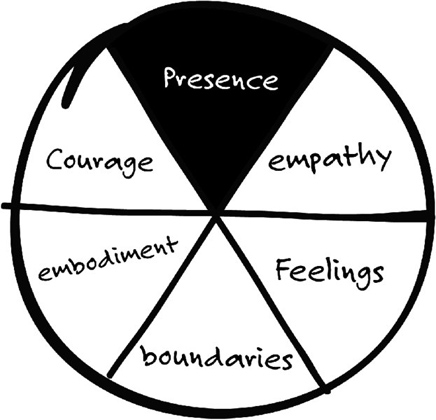Chapter 4 Presence

The ability to shift from reacting against the past to leaning into and presencing an emerging future is probably the single most important leadership capacity today. It is a capacity that is critical in situations of disruptive change, not only for institutions and systems, but also for teams and individuals.
—C. Otto Scharmer (2013)
Getting Present
To be a great coach, one committed to being fully awake and alert to ourselves and all that is around us, we need some sort of mindfulness practices. Practices that connect us to our internal experiences bring value to the way we relate, work, and coach. A practice builds our capacity to stay attuned to our self, center our self, and cultivate our internal dialogue in the service of doing our work well. As a wonderful friend and Buddhist chaplain, Claire Breeze, reminds us: “Mindfulness is not about sitting on a pillow; it’s about building the capacity to tune into what is happening in the moment, to notice it and work with it. It’s not about emptying one’s mind; it’s about noticing what’s going on and building a practice of curiosity.” A mindfulness practice, a discipline returned to daily, changes the way we relate, changes what we notice, and deepens our work as coach by cultivating our presence. Breeze also reminds us that it is impossible to get a mindfulness practice wrong. Find what works best for ...
Get Self as Coach, Self as Leader now with the O’Reilly learning platform.
O’Reilly members experience books, live events, courses curated by job role, and more from O’Reilly and nearly 200 top publishers.

